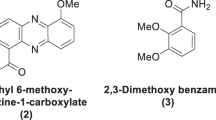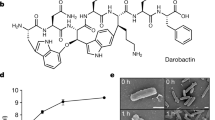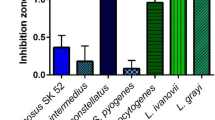Abstract
FROM the intestinal tract and the fæces of a strain of the larvæ of the wax moth (Galeria melonella), a micro-organism producing an antibiotic has been isolated. Morphologically, it belongs to the Actinomycetes, grows readily and spores abundantly on slightly alkaline nutrient agar, potato agar and asparagine agar, with an optimal yield of the antibiotic in a liquid medium containing 2–4 per cent corn-steep liquor and 1 per cent glucose. At 37° C. a surface culture on the latter medium begins to produce the antibiotic on the third day, with a maximal yield from the sixth to the ninth days. During growth the initial pH 7.4–7.6 of the medium rises to 8–8.5, accompanied by a steady decrease of carbohydrate and nitrogen concentration. At the peak of production a rapid lysis of mycelium takes place; but on further incubation the antibiotic concentration of the medium is not reduced.
This is a preview of subscription content, access via your institution
Access options
Subscribe to this journal
Receive 51 print issues and online access
$199.00 per year
only $3.90 per issue
Buy this article
- Purchase on Springer Link
- Instant access to full article PDF
Prices may be subject to local taxes which are calculated during checkout
Similar content being viewed by others
Author information
Authors and Affiliations
Rights and permissions
About this article
Cite this article
VÁLYI-NAGY, T., ÚRI, J. & SZILÁGYI, I. Primycin, a New Antibiotic. Nature 174, 1105–1106 (1954). https://doi.org/10.1038/1741105b0
Issue Date:
DOI: https://doi.org/10.1038/1741105b0
This article is cited by
-
Structural and functional comparison of Saccharomonospora azurea strains in terms of primycin producing ability
World Journal of Microbiology and Biotechnology (2020)
-
Complex formation between primycin and ergosterol: entropy–driven initiation of modification of the fungal plasma membrane structure
The Journal of Antibiotics (2012)
-
Thoughts and facts about antibiotics: Where we are now and where we are heading
The Journal of Antibiotics (2012)
-
The mode of action of primycin
Archives of Microbiology (1979)
Comments
By submitting a comment you agree to abide by our Terms and Community Guidelines. If you find something abusive or that does not comply with our terms or guidelines please flag it as inappropriate.



